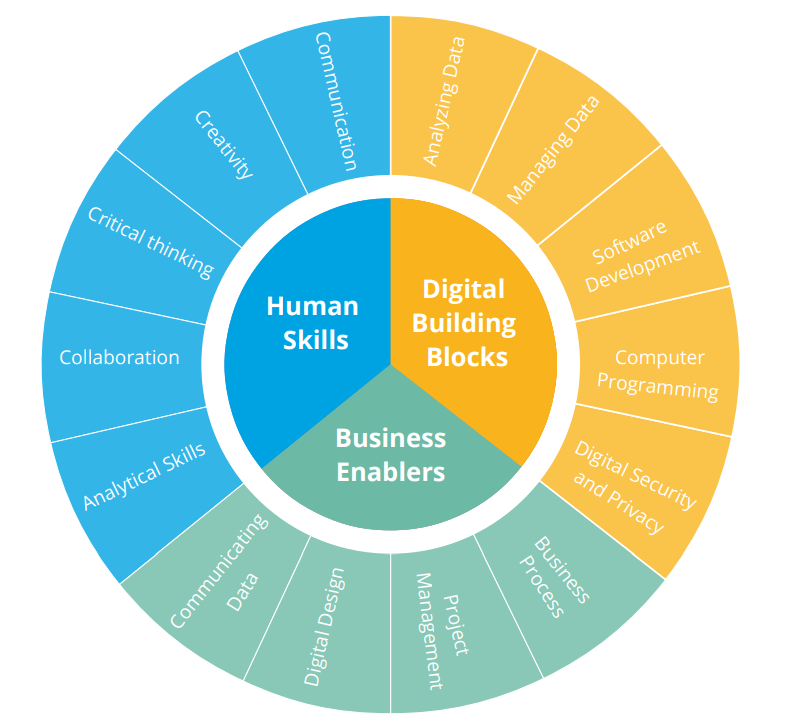
- The future of work is rapidly changing.
- Certain skills are becoming increasingly important as companies seek workers who can adapt to changing environments and collaborate effectively with others.
- We take a look at some of the key trends to look out for in the future of work and the jobs that will be in demand.
The future of work is rapidly changing with advancements in technology, artificial intelligence, globalisation, and shifting demographics.
These changes are creating new opportunities and challenges for workers in all industries.
The jobs of the future will require a different or updated set of skills, knowledge and abilities than those of the past.
Let's take a look at some of the key trends to look out for in the future of work.
Automation
One of the biggest trends in the future of work is automation, which is currently a big theme with the rapid rise of generative AI as one aspect of it. Automation is essentially the use of technology to perform tasks that were previously done by humans.
This trend is expected to continue and will likely impact a range of industries, from manufacturing to healthcare.
According to a report by McKinsey, hundreds of millions of workers worldwide may need to switch occupations by 2030 due to automation. However, this also means that there will be new jobs created as a result of automation, such as robot coordinators, data analysts, and cybersecurity experts.
"While technical feasibility of automation is important, it is not the only factor that will influence the pace and extent of automation adoption," the report says.
"Other factors include the cost of developing and deploying automation solutions for specific uses in the workplace, the labour-market dynamics (including quality and quantity of labour and associated wages), the benefits of automation beyond labor substitution, and regulatory and social acceptance."
The gig economy
Another trend to look out for is the rise of the gig economy. The gig economy is a labour market characterised by the prevalence of short-term contracts or freelance work as opposed to the traditional "permanent jobs".
This trend has been fueled by the growth of online platforms such as Uber, Airbnb, and Fiverr, which connect workers with customers or clients.
The gig economy was further intensified by the economic impact of the Covid-19 pandemic and made way for a new, but related, trend referred to as the passion economy. The World Economic Forum (WEF) says the passion economy is where micro-entrepreneurs monetise their individuality and creativity.
WEF said:
South Africa is currently facing a youth unemployment crisis where a large number of young people in the country are unable to participate meaningfully in the economy.
In the last quarter of 2022, South Africa's youth unemployment rate stood at 45.5%, and a report by Launch League, a training hub for South African entrepreneurs, suggests that it's becoming increasingly clear that many won't be able to get stable jobs in the formal industries as we know them.
The report highlights the gig economy as a potential means for income for youth struggling with unemployment.
"With technological disruption, we have the opportunity to upskill and reskill young people with the appropriate skills and work-related capabilities that orientate them towards new opportunities to earn an income," the report says.
It adds:
"By developing skills in entrepreneurship, digital technologies and gig work, they can provide youth a bridge to help them transition to these pathways to income."
Digital skills
The third trend to look out for is the increasing demand for workers with digital skills. As technology continues to advance, companies will need workers who can leverage digital tools and data to improve their operations and decision-making.
According to a report by Burning Glass Technologies, digital skills are becoming essential across a wide range of occupations, including marketing, finance and healthcare.
This trend is also reflected in the growing demand for jobs in technology-related fields, such as software development, cybersecurity, and data analytics.
The report says there are three groups of skills that have emerged as critical for the digital economy: human skills, digital building block skills, and business enabler skills. It refers to them as "New Foundational Skills".
The report suggests that current job seekers should pursue strategies to acquire these New Foundational Skills. Here's what it advises:
- Identify gaps in current knowledge around new foundational skill areas.
- Use internal training, boot camps, or education benefits to build these skills.
- Learn to effectively communicate with, and learn from, digitally savvy peers.
- Gain experience with adjacent tasks and functions, to develop the new skills.
- Learn to signal demonstrable competencies in new foundational skills areas.
Soft skills
A fourth trend to look out for is the importance of soft skills in the future of work. Soft skills are personal attributes that enable someone to interact effectively with others.
According to a report by the WEF, the top 10 skills that employers will be looking for in 2025 are:
- Analytical thinking and innovation.
- Active learning and learning strategies.
- Complex problem-solving.
- Creativity, originality and initiative.
- Leadership and social influence.
- Technology use, monitoring and control.
- Technology design and programming.
- Resilience, stress tolerance and flexibility.
- Reasoning, problem-solving and ideation.
- Critical thinking and analysis.
These skills are becoming increasingly important as companies seek workers who can adapt to changing environments and collaborate effectively with others.




 Publications
Publications
 Partners
Partners

























